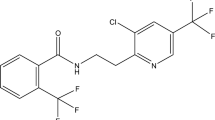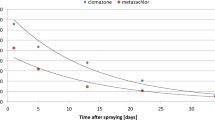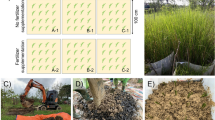Abstract
SODIUM 2,4-dichlorophenoxy-ethyl-sulphate, a chemical of low intrinsic phytotoxicity, can be sprayed in relatively concentrated aqueous solutions on to plants normally sensitive to the hormone herbicides, without serious damage to them; but when it comes into contact with the soil, a high phytotoxicity is generated, sufficient to give satisfactory control of weed-seed germination in the surface layers of the soil1. The toxic compound arising from it has been assumed to be 2,4-dichlorophenoxyacetic acid (2,4-D).
This is a preview of subscription content, access via your institution
Access options
Subscribe to this journal
Receive 51 print issues and online access
$199.00 per year
only $3.90 per issue
Buy this article
- Purchase on Springer Link
- Instant access to full article PDF
Prices may be subject to local taxes which are calculated during checkout
Similar content being viewed by others
References
King, L. J., Lambrecht, J. A., and Finn, T. P., Contrib. Boyce Thompson Inst., 16, (4), 191 (1950).
Audus, L. J., Plant and Soil, 3, (2), 170 (1951).
Author information
Authors and Affiliations
Rights and permissions
About this article
Cite this article
AUDUS, L. Fate of Sodium 2,4-Dichlorophenoxy-ethyl-sulphate in the Soil. Nature 170, 886–887 (1952). https://doi.org/10.1038/170886b0
Issue Date:
DOI: https://doi.org/10.1038/170886b0
This article is cited by
Comments
By submitting a comment you agree to abide by our Terms and Community Guidelines. If you find something abusive or that does not comply with our terms or guidelines please flag it as inappropriate.



